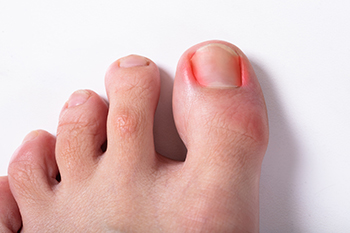
(908) 381-8160Berkeley Heights

The medical term for the foot condition known as an ingrown toenail is onychocryptosis. It is generally painful and may become infected if prompt treatment is not received. Ingrown toenails develop when the toenail grows into the skin instead of over it. The nail may grow into the skin as a result of wearing shoes that do not fit correctly or from trimming the toenails improperly. Many people have toenails that naturally curve, and this can occur due to genetic reasons. Patients who frequently participate in physical activities like ballet dancers, football players, and kickboxing experts may also experience this condition. Additionally, if you injure a toe, the result may be an ingrown toenail. Mild relief may be found when soaking the affected foot in warm water, followed by using a piece of cotton to gently pull the nail away from the skin. This is generally a temporary fix, and medical attention is often needed for complete healing. If you have endured an ingrown toenail, it is strongly advised that you consult with a podiatrist who can effectively treat this condition.
Ingrown toenails may initially present themselves as a minor discomfort, but they may progress into an infection in the skin without proper treatment. For more information about ingrown toenails, contact Dr. Janet Leicht of New Jersey. Our doctor can provide the care you need to keep you pain-free and on your feet.
Ingrown Toenails
Ingrown toenails are caused when the corner or side of a toenail grows into the soft flesh surrounding it. They often result in redness, swelling, pain, and in some cases, infection. This condition typically affects the big toe and may recur if it is not treated properly.
Causes
You are more likely to develop an ingrown toenail if you are obese, have diabetes, arthritis, or have any fungal infection in your nails. Additionally, people who have foot or toe deformities are at a higher risk of developing an ingrown toenail.
Symptoms
Some symptoms of ingrown toenails are redness, swelling, and pain. In rare cases, there may be a yellowish drainage coming from the nail.
Treatment
Ignoring an ingrown toenail can have serious complications. Infections of the nail border can progress to a deeper soft-tissue infection, which can then turn into a bone infection. You should always speak with your podiatrist if you suspect you have an ingrown toenail, especially if you have diabetes or poor circulation.
If you have any questions, please feel free to contact our office located in Berkeley Heights, NJ . We offer the newest diagnostic and treatment technologies for all your foot care needs.